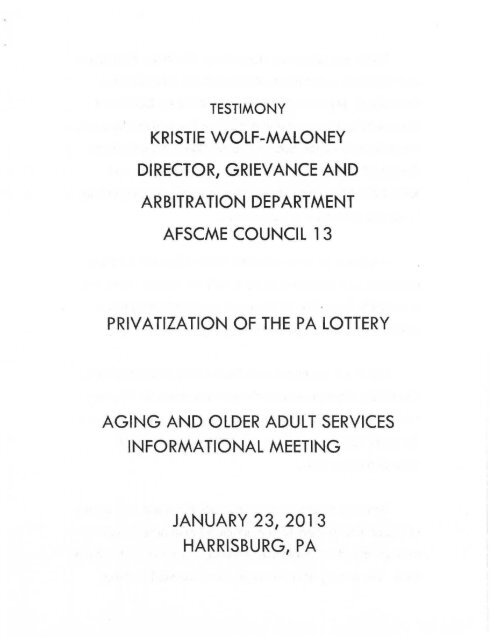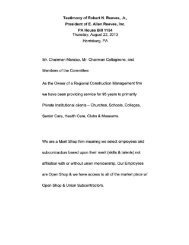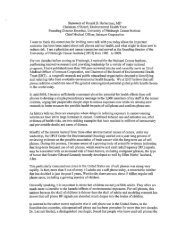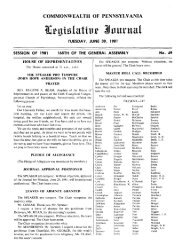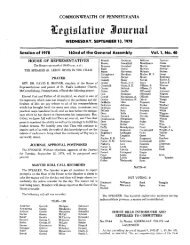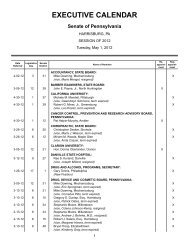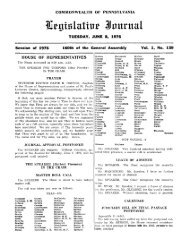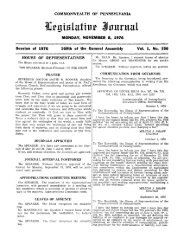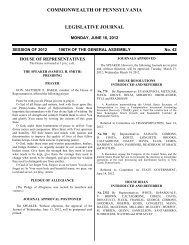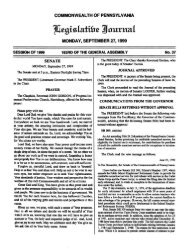Kristie Wolf-Maloney - The Pennsylvania General Assembly
Kristie Wolf-Maloney - The Pennsylvania General Assembly
Kristie Wolf-Maloney - The Pennsylvania General Assembly
You also want an ePaper? Increase the reach of your titles
YUMPU automatically turns print PDFs into web optimized ePapers that Google loves.
TESTIMONY<br />
KRISTIE WOLF-MALONEY<br />
DIRECTOR, GRIEVANCE AND<br />
ARBITRATION DEPARTMENT<br />
AFSCME COUNCIL 13<br />
PRIVATIZATION OF THE PA LOTTERY<br />
AGING AND OLDER ADULT SERVICES<br />
INFORMATIONAL MEETING<br />
JANUARY 23, 2013<br />
HARRISBURG, PA
2<br />
Thank you Chairman Hennessey, Chairman Samuelson<br />
and members of the House Aging & Older Adult Services<br />
Committee. My name is <strong>Kristie</strong> <strong>Wolf</strong>-<strong>Maloney</strong>, Director of<br />
Council 13's Grievance and Arbitration Department; and with<br />
me is Michael Fedor, Subcontracting Compliance Manager.<br />
On behalf of our Executive Director, David Fillman, and<br />
AFSCME's 65,000 members, we appreciate any opportunity<br />
to vet this process in a public forum.<br />
In respect for time restraints and to allow more time for<br />
questions, our testimony today is very condensed; however,<br />
a complete Executive Summary of our counterproposal is<br />
included with our written testimony.<br />
175 of our members work for the <strong>Pennsylvania</strong> Lottery.<br />
Our lottery employees have done a superb job for 42 years.<br />
I don't think anyone - even those who want to turn this into a<br />
'for-profit' entity- can argue that this isn't the best run<br />
operation in the state.<br />
Typically, subcontracting requests are made due to lack<br />
of equipment, inability to hire additional staff and/or inability<br />
to keep up with technological advances. That is not the case<br />
here. We already have the equipment, the staff and the
3<br />
expertise to keep this work in-house, and expand gaming if it<br />
is found to be legal.<br />
This process is moving at an alarming speed. With 10<br />
days to respond to our 68-page counterproposal the Dept. of<br />
Revenue responded in just 3 days with a 2 1!2 page denial.<br />
45 minutes later - and before the first public hearing - Gov.<br />
Corbett reached a deal with Camelot. 6 days later the<br />
governor signed the contract with Camelot. AFSCME first<br />
heard about the single foreign bidder in November - and<br />
now, in the midst of escalating questions and concerns from<br />
taxpayers AND legislators- we already have a signed deal.<br />
And AFSCME found out the governor signed the Camelot<br />
contract through the media- we were never notified.<br />
Recently the governor has said contracting out our<br />
lottery is just like contracting out road salt- that he does this<br />
kind of thing every day. Well, we think a person's livelihood<br />
is not comparable to bidding on some salt. Under a Camelot<br />
take-over more than two-thirds of the 230 <strong>Pennsylvania</strong>ns<br />
now employed by the lottery would lose their jobs -<br />
permanently.
4<br />
We've heard these employees could be interviewed for<br />
positions under a Camelot reign, but there's NO<br />
GUARANTEE. I would think Camelot would want these folks<br />
back- (after all, what does a British company know about<br />
the small towns and 'mom and pop' retailers in<br />
<strong>Pennsylvania</strong>)- but at what cost? Would these dedicated,<br />
established, long-term employees suddenly find themselves<br />
making minimum wage? We just don't know.<br />
Here's the bottom line. With a private, for-profit<br />
company every dollar that goes to Camelot "expenses" is $1<br />
less going to seniors. Right now 1 00% of the lottery profits<br />
go to fund senior programs. According to the Camelot PMA,<br />
up to 5% of profits could go to Camelot. Last year net<br />
revenues were $1.06 billion- so maximum profits paid to<br />
Camelot could have been $53 million! That's $53 million that<br />
would not go to senior programs.<br />
<strong>The</strong> <strong>Pennsylvania</strong> Lottery reported more than $3.5<br />
billion in sales last year- it's most ever- an increase of<br />
8.5°/o over the previous year. Since its inception, it's<br />
generated more than $20 billion in revenues- with only 2%<br />
administrative costs! And it's on course to have another<br />
record setting year, likely to top $3.6 billion in gross sales!
5<br />
And given the opportunity to operate the lottery under<br />
the same expansion provided Camelot, we would beat their<br />
projected profits for our growing senior population by at least<br />
10% to 30% - without padding pockets of corporate<br />
executives and C.E.O.'s at the expense of our seniors.<br />
Can improvements be made? Of course. But<br />
improvements can take place now - without 1 furlough, 1<br />
layoff, or 1 dollar of profit going to a foreign corporation. Our<br />
folks are doing a great job now- why not give them the<br />
opportunity to expand before looking to a private company?<br />
In AFSCME's counterproposal we found 3 major<br />
conclusions:<br />
1- Expansion of Keno and online games, a loyalty<br />
program and subscription service can be done in<br />
house at less cost.<br />
2- Camelot's best annual "guaranteed" profits to the<br />
lottery are based on you voting to make the current<br />
temporary 27% minimum fund requirement for senior<br />
programs permanent. A permanent reduction to 27%<br />
would be a loss of $1.24 billion to senior programs<br />
over 20 years. That is the vote Camelot and<br />
Department of Revenue may soon be asking you to<br />
cast.
6<br />
3- Based on a true dollar-for-dollar comparison, the<br />
PMA's 'fiscal guarantee' is actually about two-thirds<br />
LESS of a guarantee than already exits! In the<br />
Camelot PMA there's a 5%, annual cap on what the<br />
commonwealth could draw from the security fund.<br />
That means taxpayers would be on the hook for<br />
losses greater than 5%.<br />
In conclusion, none of us have seen Camelot's<br />
proposal. None of us understand the rush to sell our most<br />
successful operation without a full vetting process. And<br />
none of us want profits skimmed off senior programs to pad<br />
the pockets of foreign CEO's.<br />
We're ready to answer your questions at this time.
A WIN-WIN FOR PENNSYLVANIA:<br />
Continued Public Management and Operation of the<br />
<strong>Pennsylvania</strong> Lottery<br />
Prepared by:<br />
AFSCME Council 13<br />
January 8, 2013<br />
EXECUTIVE SUMMARY<br />
In November 2012, the Corbett Administration notified AFSCME that it was<br />
exploring a Private Management Agreement (PMA) for the <strong>Pennsylvania</strong> Lottery to<br />
"provide more reliable and predictable revenue to ensure the continued strength and<br />
viability of programs supporting older <strong>Pennsylvania</strong>ns." <strong>The</strong> Administration committed<br />
that prior to executing a PMA, it would "verify that the private manager's annual profit<br />
commitments are significantly higher than the profit levels the <strong>Pennsylvania</strong> Lottery<br />
could achieve on its own, in order to justify the agreement and the incentive payments<br />
to the manager." 1<br />
Over the past six weeks AFSCME has reviewed thousands of pages of public<br />
documents as well as documents provided by the Commonwealth in response to a<br />
request for information and has concluded that the privatization of the Lottery will not<br />
meet the Administration's goals of providing "significantly higher" profit levels than the<br />
<strong>Pennsylvania</strong> Lottery could achieve on its own. <strong>The</strong> Commonwealth has failed to<br />
demonstrate that privatization of the Lottery will result in "improved delivery of services"<br />
and therefore, the work should not be contracted. Rather, the Commonwealth should<br />
adopt the thoughtful and reasonable alternative measures that AFSCME recommends<br />
in its full report. AFSCME believes that with the adoption of these alternatives, the<br />
Commonwealth can achieve the same desired goals without layoffs, downgrades, or<br />
the reassignment of bargaining unit work to private contracts.<br />
This is a summary of AFSCME's research, findings, and written proposals for<br />
enhancing the services and funding delivered through public operation of the<br />
<strong>Pennsylvania</strong> Lottery. For full explanations and data, as well as all of AFSCME's written<br />
alternatives, please see the full report at www.afscme13.org.<br />
1 <strong>Pennsylvania</strong> Lottery Private Management Agreement Summary of Terms and Conditions.<br />
Commonwealth of <strong>Pennsylvania</strong>, Office of the Governor
Element 1 : <strong>The</strong> Fiscal Guarantee<br />
<strong>The</strong> Commonwealth claims a Private Management Agreement (PMA) will provide an<br />
Annual Profit Commitment (APC), backed by a cash collateral provided by the<br />
manager of $150 million and a $50 million Letter of Credit (LOC), which will result in<br />
more predictable funding.<br />
AFSCME Research and Assertions:<br />
<strong>The</strong> Annual Profit Commitment (APC) is less than what AFSCME members<br />
could deliver under the same lottery offerings as outlined in the PMA.<br />
<strong>The</strong> Commonweo.lth has ino.ccur8.te!y c!8.1med that Camelot, the sole bidder for<br />
the <strong>Pennsylvania</strong> Lottery, would provide more funding for senior programs over 20<br />
years than public management because of its increased net revenue projections.<br />
Based on the details provided in the full written union alternatives, we project over the<br />
next six years a $799 million difference between the profit guarantees of the private<br />
manager and the continued public management and operation of the <strong>Pennsylvania</strong><br />
Lottery. <strong>The</strong>se estimates are conservative and are based on the expansions and<br />
improvements outlined in our union written alternatives.<br />
Camelot APC vs. Projected Net Revenues w Expanded Gaming (Yrs 1 -5)<br />
• Public Employees Net Revenues (Projected with Expansions)<br />
Camelot Profit Commitments (Projected with Expansions)<br />
$1,900,000,000.00<br />
$1,520,000,000.00<br />
$1,140,000,000.00<br />
$760,000,000.00<br />
$380,000,000.00<br />
$0<br />
YR 1 YR 2 YR 3 YR 4 YR 5 YR 6<br />
2
<strong>The</strong> Annual Profit Commitment is not more predictable than the historic<br />
performance of the <strong>Pennsylvania</strong> Lottery<br />
-·- -·· -- .. - · --·--- -- - $4,000,000,000<br />
--· - ----·---- ----·· 3,200,000,000<br />
1991-92 96-97 01-02 06-07<br />
EJ Gross Annual Lottery Sales<br />
2,400,000,000<br />
1,600,000,000<br />
,000,000<br />
AFSCME believes any reasonable person viewing the chart above would say<br />
that Lottery sales are predictable and that an annual sales commitment already exists.<br />
Total annual Lottery sales have not been below $2.4 billion since Powerball was added<br />
a decade ago (2002), and have not been below $3 billion since 2005-06 when the<br />
Millionaire Raffle became a core offering . <strong>The</strong>se revenues held true despite the worst<br />
economic calamity since the Great Depression, the Global Recession (2007-09). This<br />
same recession caused a decline in lottery retailers between 2009-10 when businesses<br />
in the Commonwealth were folding at a record pace and revenue collections in all other<br />
areas of state government were down more significantly than the sales of the State<br />
Lottery.<br />
3
<strong>The</strong> fiscal guarantee, $150 million cash collateral and $50 LOC, is a<br />
falsehood; the maximum the Lottery could ever draw in a single year is<br />
$95.9 million.<br />
<strong>The</strong> "guarantee" does not exist as the Commonwealth has asserted because the<br />
Manager's Security and LOC have a maximum allowable withdrawal. <strong>The</strong> PMA<br />
stipulates that at no time may the cash withdrawal (or direct payment by Camelot to the<br />
Commonwealth) for failed APC's be greater than 5% of that year's "profits. " While the<br />
total amount of the proposed fund is $200 million, there is no scenario of profit<br />
shortfalls where the Commonwealth could withdrawal the entire amount, even if the<br />
total profit miss was $200 million or more in a single year. Let's explore an example of<br />
Year 1 from the PMA:<br />
Assuming the plan to privatize moves forward, and the bid is awarded to<br />
Camelot. Fast-forward to the end of Year 1 of their contract, June 2014, but things did<br />
not go as planned. Camelot did not deliver on its full Annual Profit Commitment of<br />
$1.13 billion. Despite strong sales revenues, cost overruns and slower than expected<br />
rollouts of gaming expansions led to a delivery of profits totaling $924.96 million. While<br />
this would be a strong performance for a state lottery (as strong as net revenues for the<br />
PA Lottery in 2009-10), it would be 18% under Camelot's guarantee for Year 1. <strong>The</strong> total<br />
amount of the shortfall of the profit commitment would be $203 million. However, due to<br />
the PMA and federal law, the most the Commonwealth could draw from Camelot or its<br />
security fund is $46.3 million. This is a $156.7 million shortfall that the State Lottery<br />
Fund and possibly <strong>General</strong> Fund would be on the hook to make up to fund senior<br />
programs, despite the $200 million Manager's Security.<br />
In fact, the most money under any scenario the administration could expect from<br />
Camelot as a penalty for a failure to make its Year 1 Profit Commitment is $53.7 million,<br />
which is consistent with profits 4. 77% lower than the commitment.2 3<br />
Of all the scenarios we investigated, the maximum draw from the Manager'&<br />
Security would be $95.9 million in Year 20 if Camelot delivered profits 4.77% lower than<br />
its guarantee. <strong>The</strong>refore, this is the maximum guarantee available to the<br />
Commonwealth for its APC, not the $200 million it has so often asserted,<br />
This $95.9 million guarantee from Camelot to support missed projected sales is<br />
half of what exists today in the State Lottery Fund. This informal reserve has backed<br />
2 Appendix 2 - Full Report<br />
3 Assumes implementation of "27% Law" Outline in Commonwealth's PMA<br />
4
lottery sales projections for 42 years, and it has never failed to be sufficient to back the<br />
needs of the Lottery Fund.<br />
<strong>The</strong> <strong>Pennsylvania</strong> Lottery has more money in reserve now from previous<br />
operational surpluses to guarantee Lottery Profits than that which is<br />
actually available from Camelot. If we acted to formalize and strengthen the<br />
Lottery Reserve in the Lottery Fund, long-term guarantees would exist<br />
without privatization.<br />
Minor changes to how the Fund Balance is managed, how the Commonwealth<br />
projects year to year sales, and projects annual funding commitments would result in<br />
more predictable funding than private management. <strong>The</strong> existence of a substantial and<br />
growing end of year State Lottery Fund balance in 2012, even after years of raiding the<br />
State Lottery Fund for programming monies, demonstrates the quick ability of the<br />
<strong>Pennsylvania</strong> Lottery Fund to replenish and create its own fiscal guarantee.<br />
For full details on improving the State Lottery and the maintenance of a reserve,<br />
see the full report.<br />
Element 2: Funding for Older <strong>Pennsylvania</strong>ns<br />
<strong>The</strong> Commonwealth asserts the PMA "provides assurances that senior programs<br />
receive all allocated funding without the Commonwealth's diversion of monies from<br />
other programs." <strong>The</strong> Commonwealth and the Governor have further claimed<br />
privatization would only proceed if it meant substantially "more money for <strong>Pennsylvania</strong><br />
seniors." AFSCME's research demonstrates seniors would receive less money under<br />
privatization than continued public operation and management.<br />
Camelot wants to begin its operation by cutting senior funding by 10%.<br />
For the past ten years the Lottery has returned on average 35% of gross sales to<br />
fund senior programs. <strong>The</strong> private manager is guaranteeing a return of 27% of gross<br />
sales on an expanded Lottery, and supposedly $34.6 billion in profits over twenty<br />
years. However, to deliver on that amount. Camelot and the Commonwealth propose<br />
cutting the mandatory amount of profits available to fund programs for seniors by 10%<br />
right out of the gate.<br />
Camelot's profit commitments for the first three years are lower than what is<br />
necessary to fund programs for seniors. This is because Camelot's projections are<br />
premised on a statutory cut in the percentage of sales that must go to benefit seniors<br />
5
from 30% to 27% - ten percent -and proposes it remain there for the next 20 years.<br />
This amounts to $1 244 billion in lost revenues to fund senior programs over 20 years.<br />
If public employees have the opportunity to operate the Lottery under the same<br />
expansion, they would beat the private manager's guaranteed profits each year by at<br />
least 10%-30%.<br />
Senior Funding as % of Sales Under Public Operation<br />
rJ Camelot Profits Available for Seniors as % of Sales<br />
2006-0707-08 08-09 09-10 10-11 11-1 2 12-13 Yr 1 Yr 2<br />
*FY 12-13 Estimated Based on IFO Sales Projecti on<br />
Yr3<br />
50%<br />
40%<br />
30%<br />
20%<br />
Growth in programs and services funded by the Lottery (as well as their co/lective<br />
budgets) have increased in the last twenty years at a rate double the growth of<br />
Lottery net revenues.<br />
While it is true that the senior citizen population is growing steadily and<br />
substantially, this does not automatically translate into exponential increases for the<br />
costs of the programs the Lottery funds for this population. <strong>The</strong>re are numerous<br />
external factors and socioeconomic conditions that are changing the programming<br />
landscape for these expenditures. Take for example Medicare Part 0 and the<br />
Affordable Care Act (aka Obamacare), which are already estimated to save<br />
10%<br />
0%<br />
6
prescription drug programs more than $731 .5 million that the <strong>Pennsylvania</strong> Lottery<br />
funds over the next ten years. 4<br />
Since FY 2002-03, the <strong>General</strong> <strong>Assembly</strong> and three governors have added<br />
$411 6 million in additional spending to the State Lottery Fund, a compound annual<br />
growth rate of 4. 1%, while net revenues of the Lottery over the same period grew at a<br />
rate half that at 2 8%.<br />
What the Commonwealth of <strong>Pennsylvania</strong>, its privatization team , and the lone<br />
bidder Camelot failed to take into account is that although the state statute mandates a<br />
minimum amount of money that must come from Lottery ticket sales to fund senior<br />
programs, the state has never spent the minimum amount allowable on Lottery's<br />
supported programs for seniors. In fact, the trend has been to raid the State Lottery<br />
fund in search of remote relevance back to the benefit of older <strong>Pennsylvania</strong>ns to fund<br />
spending priorities.<br />
<strong>The</strong> anticipated program costs graphed below are based on the February 2012<br />
Legislative Budget and Finance Committee Report on "<strong>Pennsylvania</strong> Lottery Funding of<br />
Programs and Services for Older <strong>Pennsylvania</strong>ns" and the 2012-13 Adopted Budgeted<br />
Allocations of the State Lottery Fund. It assumes the same programs currently funded<br />
by the Lottery will continue, that Medical Long Term Care funding levels continue at<br />
current levels, and all other program costs estimates stated by the LB & FC Report are<br />
valid.s<br />
4 <strong>Pennsylvania</strong> <strong>General</strong> <strong>Assembly</strong>. (Feb 2012). <strong>Pennsylvania</strong> Lottery Funding of<br />
Programs and Services for Older <strong>Pennsylvania</strong>ns. Harrisburg, PA: Legislative Budget &<br />
Finance Committee. Retrieved from htto://lbfc.legis.state.oa.us/reoortsi2012/62POF.<br />
s Appendix 4 - Full Report<br />
7
Camelot's Annual Profit Commitments Insufficient (Year 1)<br />
tt Camelot Guarantee Year 1 Uncovered Senior Program Costs<br />
$1<br />
Camelot's Annual Profit Commitments Insufficient (Year 2)<br />
Camelot Guarantee Year 2 C) Uncovered Senior Program Costs<br />
$1 ,217,000,000<br />
8
Today, with net revenues over $1 billion annually, net revenues are 175% higher<br />
than 20 years ago. Three exceptional points exist with regard to historic net revenues.<br />
As a percentage of gross sales:<br />
• Net revenues (profits) have consistently remained above 29.5%6<br />
• Net revenues (profits) over the past 20 years have averaged 36%.7<br />
• On information and belief, at no point in the last 20 years has the <strong>General</strong><br />
<strong>Assembly</strong> budgeted senior program support below 30% of gross sales.<br />
<strong>The</strong> 20 year average is 38%.a<br />
Element 3: Lottery Expansion and Long-Term Growth<br />
<strong>The</strong> Commonwealth has set up automatic expansion of the Lottery once its contract is<br />
signed with Camelot Global Services PA LLC.<br />
<strong>The</strong> privatization would lead to the loss or reassignment of work for 258 Commonwealth<br />
employees, 17 4 of whom are represented by AFSCME, over the course of a six month<br />
transition of operations from the Commonwealth to the private manager.<br />
AFSCME would support legal expansion of Lottery offerings as a means of<br />
securing more net revenues to support funding needs for older<br />
<strong>Pennsylvania</strong>ns, but the games must be responsibly marketed and not<br />
come at a price to retailers or workers.<br />
<strong>The</strong> PMA appears to achieve most of the "guaranteed gains" in profits through<br />
the expansion of Lottery's portfolio, not via the expertise of Camelot. Our research<br />
clearly shows that the Lottery could be legally expanded in the same areas and public<br />
employees could achieve the same or greater gross sales and net revenues than the<br />
sales and profits the private manager claims. <strong>The</strong>refore, privatization is wholly<br />
unnecessary to achieve the same ends.<br />
6 Appendix 1 - Full Report<br />
7 1bid<br />
Blbid<br />
10<br />
• .<br />
·.
AFSCME members working at the <strong>Pennsylvania</strong> Lottery could implement<br />
Keno immediately, and over five years, faster and to more locations than<br />
the private manager.<br />
It is not for AFSCME Council 13 to determine if unilateral expansion of gaming in<br />
the manner described in the PMA is legal. We have filed appropriate legal challenges<br />
in Commonwealth Court because we believe expansion must be authorized by the<br />
legislature, however that does not mean AFSCME Council 13 is opposed to expansions<br />
of games. In fact. whether authorized through executive or legislative action, Lottery<br />
gaming expansion can be accomplished without the assignment of management of the<br />
<strong>Pennsylvania</strong> Lottery to Camelot or any other private manager. This is evidenced by<br />
past successful expansions of the Lottery gaming portfolio (Powerball, Mega Millions,<br />
Millionaire Raffle), completed successfully with the assistance of some outside<br />
contractors but always fully owned and operated by the Commonwealth of<br />
<strong>Pennsylvania</strong>.<br />
AFSCME asserts that Internet games should have key safe guards to verify<br />
the age of the player and ensure commissions to existing brick and mortar<br />
retailers.<br />
Internet gaming, or online gaming, as contemplated by the PMA presents a<br />
complex set of challenges for retailers, the <strong>Pennsylvania</strong> Lottery, and our potential<br />
player audience. It is also unresolved to what extent Internet lottery gaming would be<br />
legal under existing state and federal laws, and what authority if any the Lottery has to<br />
authorize such an expansion without legislative approval. Whatever system is<br />
designed, it must comport with federal law, state law, and provide a secure<br />
environment for the transmission of valuable and sensitive information.<br />
In our full report. AFSCME Council 13 proposes a solution that will ensure that<br />
on -line gaming serves as a benefit to our brick and mortar retailers, not a hinderance to<br />
their commissions. Our solution will also ensure that age verification takes place for all<br />
online participation in the <strong>Pennsylvania</strong> Lottery, and that our program can lead the way<br />
with innovation and reaching a much younger player demographic with game offerings<br />
that are more beneficial to the net revenues of the <strong>Pennsylvania</strong> Lottery annually than<br />
the instant wins these audiences trend toward playing today.<br />
11
Operational improvements would lead to stronger customer relations,<br />
retailer relations, and net revenue performance over the long-term without<br />
privatization. <strong>The</strong>re is no need to furlough, layoff, or terminate a single<br />
employee in order to achieve the desired improvements.<br />
With these expansions outlined above, it will be important to continue to build on<br />
the number and types of authorized <strong>Pennsylvania</strong> Lottery retailers. Today there are<br />
more than 9,200 in <strong>Pennsylvania</strong>, and AFSCME believes the <strong>Pennsylvania</strong> Lottery will<br />
be able to surpass 15,000 retailers by FY 2023-24.<br />
Union Alternatives to a Private Management Agreement<br />
Visit w·ww afsc.me 13 org to see the full report with a detailed list of union alternatives to<br />
achieve the Commonwealth's desire to have "more reliable projections tor annual sales<br />
revenues," as well as reliable mechanisms for "guaranteeing" a minimum level of<br />
funding to support the senior programs Lottery funds, expand both sales and net<br />
revenue opportunities, and enhance the Lottery playing experience.<br />
Commonwealth Fails to Demonstrate Improved Delivery of Service<br />
Based on our analysis, the Commonwealth has failed to meet its burden of<br />
proof of providing improved delivery of service through assigning Master Agreement<br />
and Master Memorandum work outside of the contract. We offer these written<br />
alternatives as clearly sufficient means to achieve the service improvements the<br />
Commonwealth seeks without a single layoff, furlough or downgrade.<br />
AFSC ME Council 13 looks forward to being a partner with the Commonwealth<br />
of <strong>Pennsylvania</strong> in further modernizing, expanding, and improving the services of the<br />
<strong>Pennsylvania</strong> Lottery to move even closer to becoming the Number One publicly<br />
managed, operated and owned Lottery in the nation.<br />
12


